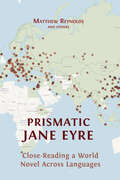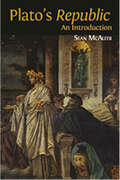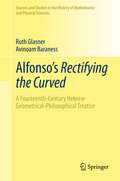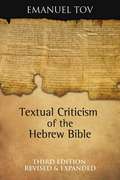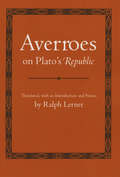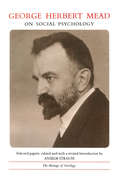- Table View
- List View
Divine Style: Walt Whitman and the King James Bible
by F. W. Dobbs-AllsoppIn exploring the seminal works of Walt Whitman, the great American poet, many commentators have acknowledged the underlying influence of The King James Bible. However, a study has yet to elucidate the precise manner in which the Bible has shaped Whitman’s poetic style. This is the deficit that F. W. Dobbs-Allsopp seeks to address in his new piece of literary scholarship: 'Divine Style: Walt Whitman and the King James Bible'. Dobbs-Allsopp, Professor of Old Testament at Princeton Theological Seminary, explicitly approaches Whitman from the perspective of a biblical scholar. Utilising his wealth of expertise in this field, he constructs a compelling, erudite and methodical argument for the King James Bible’s importance in the evolution of Whitman’s style – from his signature long lines to the prevalence of parallelism and tendency towards parataxis in his works. 'Divine Style' focuses on Whitman’s output in the years preceding the release of his 1855 opus 'Leaves of Grass' through the general period of the book’s first three editions. In this, Dobbs-Allsopp’s exploration of the period is exhaustive – covering not just Leaves of Grass but recently recovered notebooks, newly digitised manuscripts and additions to the corpus, such as the novel 'Life and Adventures of Jack Engle'. This is a work of careful, detailed scholarship, offering an authoritative commentary that will be a valuable resource for students of Whitman, biblical scholars and scholars of literature more generally.
Prismatic Jane Eyre: Close-Reading a World Novel Across Languages
by Matthew Reynolds OthersJane Eyre, written by Charlotte Brontë and first published in 1847, has been translated more than five hundred times into over sixty languages. Prismatic Jane Eyre argues that we should see these many re-writings, not as simple replications of the novel, but as a release of its multiple interpretative possibilities: in other words, as a prism. Prismatic Jane Eyre develops the theoretical ramifications of this idea, and reads Brontë’s novel in the light of them: together, the English text and the many translations form one vast entity, a multilingual world-work, spanning many times and places, from Cuba in 1850 to 21st-century China; from Calcutta to Bologna, Argentina to Iran. Co-written by many scholars, Prismatic Jane Eyre traces the receptions of the novel across cultures, showing why, when and where it has been translated (and no less significantly, not translated – as in Swahili), and exploring its global publishing history with digital maps and carousels of cover images. Above all, the co-authors read the translations and the English text closely, and together, showing in detail how the novel’s feminist power, its political complexities and its romantic appeal play out differently in different contexts and in the varied styles and idioms of individual translators. Tracking key words such as ‘passion’ and ‘plain’ across many languages via interactive visualisations and comparative analysis, Prismatic Jane Eyre opens a wholly new perspective on Brontë’s novel, and provides a model for the collaborative close-reading of world literature. Prismatic Jane Eyre is a major intervention in translation and reception studies and world and comparative literature. It will also interest scholars of English literature, and readers of the Brontës.
Horos: Ancient Boundaries and the Ecology of Stone
by Thea PotterIn Horos, Thea Potter explores the complex relationship between classical philosophy and the ‘horos’, a stone that Athenians erected to mark the boundaries of their marketplace, their gravestones, their roads and their private property.
Alfonso's Rectifying the Curved: A Fourteenth-Century Hebrew Geometrical-Philosophical Treatise (Sources and Studies in the History of Mathematics and Physical Sciences)
by Ruth Glasner Avinoam BaranessThis volume offers a new English translation, introduction, and detailed commentary on Sefer Meyasher 'Aqov, (The Rectifying of the Curved), a 14th-century Hebrew treatise on the foundation of geometry. The book is a mixture of two genres: philosophical discussion and formal, Euclidean-type geometrical writing. A central issue is the use of motion and superposition in geometry, which is analyzed in depth through dialog with earlier Arab mathematicians. The author, Alfonso, was identified by Gita Gluskina (the editor of the 1983 Russian edition) as Alfonso of Valladolid, the converted Jew Abner of Burgos. Alfonso lived in Castile, rather far from the leading cultural centers of his time, but nonetheless at the crossroad of three cultures. He was raised in the Jewish tradition and like many Sephardic Jewish intellectuals was versed in Greek-Arabic philosophy and science. He also had connections with some Christian nobles and towards the end of his life converted to Christianity. Driven by his ambition to solve the problem of the quadrature of the circle, as well as other open geometrical problems, Alfonso acquired surprisingly wide knowledge and became familiar with several episodes in Greek and Arabic geometry that historians usually consider not to have been known in the West in the fourteenth century. Sefer Meyasher 'Aqov reflects his wide and deep erudition in mathematics and philosophy, and provides new evidence on cultural transmission around the Mediterranean.
Studies in Rabbinic Hebrew
by Shai HeijmansThis volume presents a collection of articles centring on the language of the Mishnah and the Talmud – the most important Jewish texts (after the Bible), which were compiled in Palestine and Babylonia in the latter centuries of Late Antiquity. Despite the fact that Rabbinic Hebrew has been the subject of growing academic interest across the past century, very little scholarship has been written on it in English. Studies in Rabbinic Hebrew addresses this lacuna, with eight lucid but technically rigorous articles written in English by a range of experienced scholars, focusing on various aspects of Rabbinic Hebrew: its phonology, morphology, syntax, pragmatics and lexicon. This volume is essential reading for students and scholars of Rabbinic studies alike, and constitutes the first in a new series, Studies in Semitic Languages and Cultures, in collaboration with the Faculty of Asian and Middle Eastern Studies at the University of Cambridge.
Textual Criticism of the Hebrew Bible, Third Edition, Revised and Expanded
by Emanuel TovSince its initial publication, Textual Criticism of the Hebrew Bible has established itself as the indispensable authoritative textbook and reference on the subject. In this thoroughly revised third edition, Emanuel Tov has incorporated the insights of the last ten years of scholarship, including new perspectives on the biblical texts among the Dead Sea Scrolls, all of which have now been published. Here are expanded discussions of the contribution of textual criticism to biblical exegesis and of the role of scribes in the transmission of the text. The introduction and references throughout the book have been thoroughly revised with the beginning student of textual criticism in mind.
Averroes on Plato's "Republic"
by Averroes Ralph Lerner"In one fashion or another, the question with which this introduction begins is a question for every serious reader of Plato's Republic: Of what use is this philosophy to me? Averroes clearly finds that the Republic speaks to his own time and to his own situation. . . . Perhaps the greatest use he makes of the Republic is to understand better the shari'a itself. . . . It is fair to say that in deciding to paraphrase the Republic, Averroes is asserting that his world--the world defined and governed by the Koran--can profit from Plato's instruction."--from Ralph Lerner's IntroductionAn indispensable primary source in medieval political philosophy is presented here in a fully annotated translation of the celebrated discussion of the Republic by the twelfth-century Andalusian Muslim philosopher, Abu'l-Walid Muhammad Ibn Ahmad Ibn Rushd, also know by his his Latinized name, Averroes. This work played a major role in both the transmission and the adaptation of the Platonic tradition in the West. In a closely argued critical introduction, Ralph Lerner addresses several of the most important problems raised by the work.
George Herbert Mead on Social Psychology (Heritage of Sociology Series)
by George Herbert MeadOne of the most brilliantly original of American pragmatists, George Herbert Mead published surprisingly few major papers and not a single book during his lifetime. Yet his influence on American sociology and social psychology since World War II has been exceedingly strong. This volume is a revised and enlarged edition of the book formerly published under the title The Social Psychology of George Herbert Mead. It contains selections from Mead's posthumous books: Mind, Self, and Society; Movements of Thought in the Nineteenth Century; The Philosophy of the Act; and The Philosophy of the Present, together with an incisive, newly revised, introductory essay by Anselm Strauss on the importance of Mead for contemporary social psychology. "Required reading for the social scientist."—Milton L. Barron, Nation

